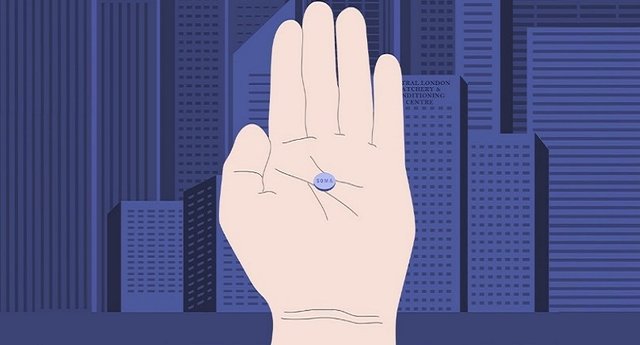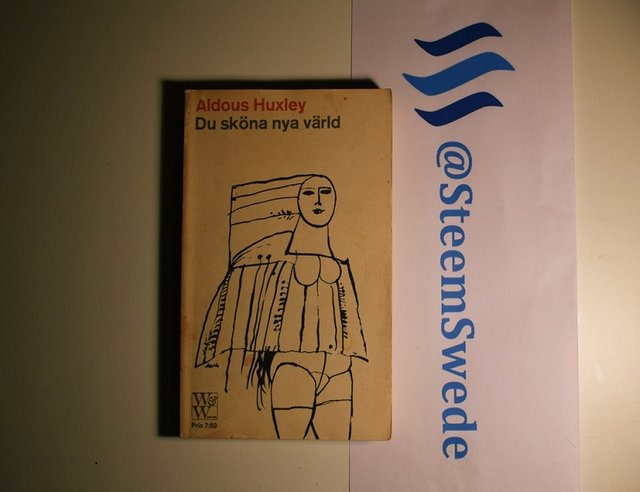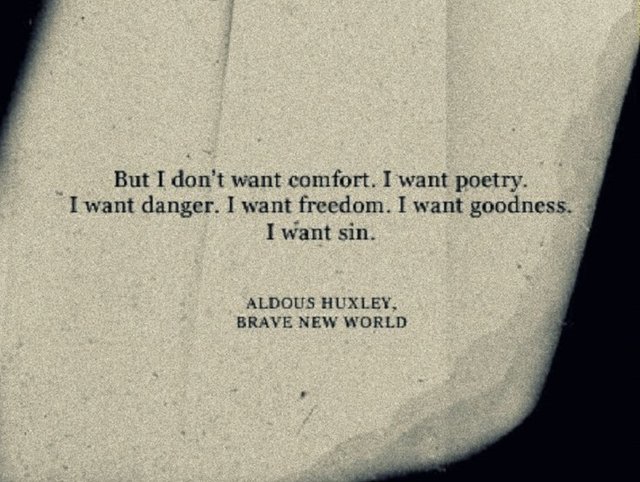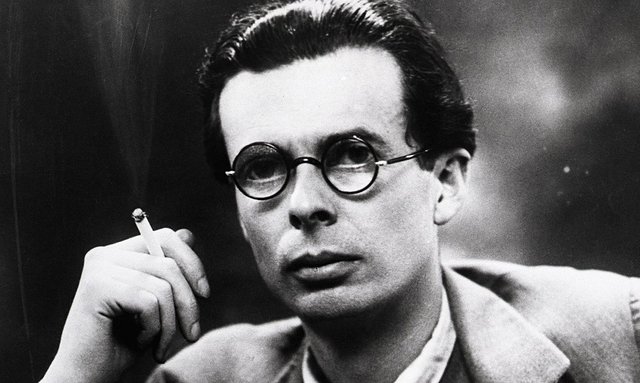[BOOK REVIEW] Brave New World (1932) by Aldous Huxley 📚
"O wonder!
How many goodly creatures are there here!
How beauteous mankind is! O brave new world,
That has such people in't." - William Shakespeare, "The Tempest"
Both Orwell and Huxley paints terrifyingly unfree communities, but in radically different ways. Orwell's State controls through media, language, history, coercion, torture and death. Huxley's state instead uses genetics, upbringing, drugs and entertainment. In Huxley's society everyone is always happy and content. At least almost everyone.
In Aldous Huxley's future scenario eugenics is at the forefront and humans are cloned and brought up in Hatching and Conditioning Centers. To control the reproductive process almost all women are hermaphrodites who can't have children and childbearing is seen as unnatural and obscene. Mothers, fathers and families are of the past, something old and outdated that you've only heard about, even embarrassing. There's no suffering or accidents, no unhappy people, no wars, no aging, no old and sick, no worry or grief. All at the expense of individuality. Life is lived out in a carefree and superficial intoxication, without any deep emotional connections. Consumption of factory-made items and the happiness maximization through various sensations is essential. This caste community consists of Alpha and Beta - persons holding high positions in society - as well as Gamma, Delta and Epsilon - the workers who through genetic engineering are designed to not have the ability to think for themselves.
Social functions are maintained further through early indoctrination, propaganda and the antidepressant drug called "Soma". The frequent consumption of this happy-pill eliminates residual or temporarily incurred and undue emotions. Such negative feelings have no place in this paradise of the senses, life must be lived without any reflection of what has been, or what's to come.
Our approach to medicate symptoms, discomfort, anxiety and panic, rather than to investigate and try to change their causes, undeniably brings to mind Huxley's dystopian society, and our entertainment industry isn't radically different from the brave new world, either.
There's also a kind of modern impatience over Huxley's novel. His way of writing is cinematic, sometimes with extremely quick cuts between scenes. A completely different tempo than what one might expect of a novel from 1932. Unfortunately, impatience also spills over on the characters, as if the author gets tired of them and abandons them here and there.
And none of them are particularly sympathetic. Identification is clearly not Huxley's strength. Bernard Marx, the discontented Alpha citizen, is simply a whiner from start to finish. The character that usually go under the name "the savage" and who has grown up in a reservation, raised by Indians and an old edition of Shakespeare's collected works, is unbearably obstinate and makes a virtue out of being irritable and jealous.
Bernhard is not like any other. He prefers to be alone. He yearns for one woman. This is why he's considered to be something of an oddball, and the others gossip that he as a fetus was damaged by an accidental alcohol injection. Bernhard succeeds in bringing his beloved, Lenina, to a wildlife sanctuary in the United States, where the natives (savages) live according to ancient customs. Here they encounter the savage (or John as his real name is) and his mother, and a lot of the novel continues to revolve around him.
In London, John discovers that not much of civilized society lives up to his imagination. He yearned to get away from the tribal society, but is not comfortable in the uniform reality that exists outside. In the clinical civilization there's no longer place for his beloved Shakespeare; the books are kept away, and they are not sought after. Dissidents are removed from the collective sent to remote islands. People are conditioned to associate negative feelings with inconsequential experiences in life (such as literature), by exposing infants to loud noises or even electric shocks when they're holding for instance a book until the desired result is reached.
The brave new world is contrasted with the Shakespearean ideals, and John Savage demands the right to solitude, and to the love of one human. And he demands the right to his own suffering, rather than the self-indulgence that reigns in the "world state."
The contrasts between Huxley's civilized people whose only taboo is to be involved in anything, whatsoever, to want to think and feel for yourself, or want to be together with a person - here promiscuity is the norm, while monogamy is seen with suspicion, not to say disgust - and our own conceptions are quite hilarious and interesting.
What I'm particularly impressed by is how clearly Huxley depicts what happens when humans aren't ready for misfortune. When she isn't allowed to cultivate her readiness for misery and calamity.
Ultimately Brave New World deals with happiness and prosperity as a form of oppression. Is this the end result when a state sees it as its task to lull its citizens into a sense of security and happiness? Does happiness lie in the eye of the beholder? Today Huxley's book can perhaps function as a warning against the superficialized society. A warning against letting entertainment push away and replace deeper reflection and the arts. Maybe the book wants to warn us from becoming a soulless collective for the sake of medical benefits, peace and well-being, but without anything underneath the facade. The road to hell is paved with good intentions and Huxley's questions are probably as relevant as ever.
— SteemSwede





Excellent book. Recommend to everyone.
Good review.
Interesting how we were wrong about 1984 being the truly prophetic work; in retrospect, Brave New World took the biscuit. It's also more subtle - I'd argue more realistic - in the part that exposes the hidden hand. Compare Mustapha Mond in chapter 16 to O'Brien in Part 3...
Of course, George Orwell did not write his book as a prophecy. In one of his more famous essays, he explained why he frowned on augur-reading:
http://orwell.ru/library/reviews/burnham/english/e_burnh.html
Interestingly, that essay was George Orwell's boot-out of James Burnham. At the time, Burnham was a well-known Trotskyite. Do you know where he ended up? As a heavyweight for he American magazine National Review!
Go figure...
It was meant to be a cautionary tale.
Not an instruction manual.
Incredible book! I enjoyed the review, as well. Seems like everyone has a Soma of one sort or another these days.